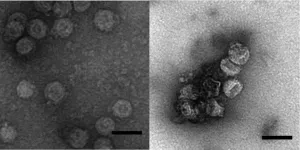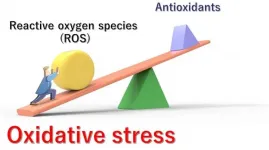Standard water treatment technique removes and inactivates an enveloped virus
2021-02-03
(Press-News.org) Enveloped viruses have been detected in raw sewage and sludge, but scientists still don't fully understand the fate and infectivity of these viruses during water purification at treatment plants. Now, researchers reporting in ACS' Environmental Science & Technology have discovered that a standard water treatment technique, called iron (III) coagulation, and its electrically driven counterpart, iron (0) electrocoagulation, can efficiently remove and inactivate a model enveloped virus.
Enveloped viruses have an outer coating of lipids and proteins that helps protect their genetic material. Typically, disrupting this coat inactivates the virus. Until now, most studies have investigated only disinfection by chlorine or ultraviolet light as a means to control enveloped viruses in wastewater. However, particles suspended in the water can sometimes shield viruses from disinfectants. Shankar Chellam and colleagues wondered whether a different method called coagulation with iron (III), which is already widely applied during water treatment, can remove and inactivate enveloped viruses. They also wanted to study a related technique, iron (0) electrocoagulation, that shows promise for small-scale water treatment. As a model enveloped virus, the researchers chose an RNA virus, called Φ6, that infects bacteria.
The researchers treated a solution containing Φ6 with either iron (III) or with iron (0) electrocoagulation, both of which formed iron precipitates. The hydrophobic viral envelopes stuck to the precipitates, allowing Φ6 to be easily removed as the solids settled. The conventional coagulation reduced the amount of active virus in the water by more than 100,000 times in 2.6 minutes, whereas electrocoagulation was slower but about 10 times more effective. The researchers observed that the structures of most of the viral particles in the iron precipitates were damaged, which rendered them unable to infect their host bacteria. Electrocoagulation also oxidized lipids in the viral envelope, further inactivating Φ6. These results suggest that water treatment plants are already well equipped to remove enveloped viruses from drinking water by iron (III) coagulation, and viral levels are likely even further reduced by the additional treatment steps of filtration and disinfection, the researchers say.
INFORMATION:
The authors acknowledge funding from the National Science Foundation.
The paper's abstract will be available on February 3 at 8 a.m. Eastern time here: http://pubs.acs.org/doi/abs/10.1021/acs.est.0c07697
The American Chemical Society (ACS) is a nonprofit organization chartered by the U.S. Congress. ACS' mission is to advance the broader chemistry enterprise and its practitioners for the benefit of Earth and its people. The Society is a global leader in providing access to chemistry-related information and research through its multiple research solutions, peer-reviewed journals, scientific conferences, eBooks and weekly news periodical Chemical & Engineering News. ACS journals are among the most cited, most trusted and most read within the scientific literature; however, ACS itself does not conduct chemical research. As a specialist in scientific information solutions (including SciFinder® and STN®), its CAS division powers global research, discovery and innovation. ACS' main offices are in Washington, D.C., and Columbus, Ohio.
To automatically receive news releases from the American Chemical Society, contact newsroom@acs.org.
Follow us: Twitter | Facebook
[Attachments] See images for this press release:

ELSE PRESS RELEASES FROM THIS DATE:
2021-02-03
Oxygen is essential for human life, but within the body, certain biological environmental conditions can transform oxygen into aggressively reactive molecules called reactive oxygen species (ROS), which can damage DNA, RNA, and proteins. Normally, the body relies on molecules called antioxidants to convert ROS into less dangerous chemical species through a process called reduction. But unhealthy lifestyles, various diseases, stress, and aging can all contribute to an imbalance between the production of ROS and the body's ability to reduce and eliminate them. The resulting excessive levels of ROS cause "oxidative stress," ...
2021-02-03
ATLANTA - FEBRUARY 3, 2021 - New study finds more than half (56.4%) of cancer survivors in the United States reported having additional underlying medical conditions associated with severe COVID-19 illness. The report appearing in JNCI: The Journal of the National Cancer Institute, suggests that prevalence of these conditions among cancer survivors is nearly 40% higher than that in the general population.
Cancer, and other underlying medical conditions, including chronic obstructive pulmonary disease, heart diseases, diabetes, chronic kidney disease, and obesity, are associated with increased risk of severe COVID-19 illness. For this study, investigators Changchuan (Charles) ...
2021-02-03
A can of Red Bull next to the computer mouse, a bag of potato chips next to the keyboard - that's how many people imagine nutrition in eSports. "The energy drink is indeed part of the diet for many," says Professor Ingo Froböse, head of the Institute of Movement Therapy and movement-oriented Prevention and Rehabilitation at the German Sport University Cologne, "but overall, eSports players actually eat better than the general population."
This is the result of the third eSport study by the German Sport University Cologne, which was presented in Cologne on February 3, 2021. The two previous eSport studies focused on training ...
2021-02-03
As the sea ice shrinks in the Arctic, the plankton community that produces food for the entire marine food chain is changing. New research shows that a potentially toxic species of plankton algae that lives both by doing photosynthesis and absorbing food may become an important player in the Arctic Ocean as the future sea ice becomes thinner and thinner.
Microscopic plankton algae, invisible to the naked eye, are the foundation of the marine food web, feeding all the ocean´s living creatures from small crustaceans to large whales. Plankton ...
2021-02-03
A study of factors associated with Post-Traumatic Stress Disorder (PTSD) has led to a number of novel findings linking nutrition to experiences of PTSD. Notable among them is the discovery that Canadians, between the ages of 45 and 85, were less likely to exhibit PTSD if they consumed an average of two to three fiber sources daily.
"It is possible that optimal levels of dietary fiber have some type of mental health-related protective effect," says Karen Davison, Director of the Nutrition Informatics Research Group and Health Science Program Faculty Member at Kwantlen Polytechnic University. "This may be due to the communication network that connects the gut and brain via short chain fatty acids (SCFAs), which are metabolic byproducts of bacterial ...
2021-02-03
Eating too much fat and sugar as a child can alter your microbiome for life, even if you later learn to eat healthier, a new study in mice suggests.
The study by UC Riverside researchers is one of the first to show a significant decrease in the total number and diversity of gut bacteria in mature mice fed an unhealthy diet as juveniles.
"We studied mice, but the effect we observed is equivalent to kids having a Western diet, high in fat and sugar and their gut microbiome still being affected up to six years after puberty," explained UCR evolutionary physiologist Theodore Garland.
A paper describing the study has recently been published in the END ...
2021-02-03
A brain-related visual impairment, which until recently was thought to be rare, may affect one in every 30 children according to new research investigating the prevalence of Cerebral Visual Impairment [CVI]. The University of Bristol-led findings published today [3 February] in Developmental Medicine and Child Neurology, aim to raise awareness of CVI among parents and teachers to help them identify signs of the condition earlier.
The brain is just as important as the eyes when it comes to seeing, and many vision problems are caused by areas of the brain that are needed for sight not working properly and cannot be resolved by wearing glasses. Brain-related vision ...
2021-02-03
During the summer of 2019, a global team of experts put their heads together to define the key questions facing the UK government when it comes to biological security.
Facilitated by the Centre for Existential Risk (CSER) at the University of Cambridge and the BioRISC project at St Catharine's College, the group of 41 academics and figures from industry and government submitted 450 questions which were then debated, voted on and ranked to define the 80 most urgent.
The final line-up includes major questions on future disease threats, including what role shifts in climate and land use might play, and whether data from social media platforms should be used to help detect the earliest signs of emerging pathogens.
Other ...
2021-02-03
Environmental pressures may have led humans to become more tolerant and friendly towards each other as the need to share food and raw materials became mutually beneficial, a new study suggests.
This behaviour was not an inevitable natural progression, but subject to ecological pressures, the University of York study concludes.
Humans have a remarkable capacity to care about people well outside their own kin or local group. Whilst most other animals tend to be defensive towards those in other groups our natural tolerance allows us to collaborate today on a global scale, as seen with trade or international relief efforts to provide aid for natural disasters.
Using ...
2021-02-03
Mandatory calorie labelling of alcoholic drinks could possibly address both alcohol consumption and obesity. An analysis published in Obesity Reviews summaries the results of studies that have examined consumer knowledge of the calorie content of alcoholic drinks, public support for labelling of calorie content on such drinks, and the effect of labelling on consumption.
In the analysis of 18 relevant studies, there was moderate evidence that people were unaware of the calorie content of alcoholic drinks and that they supported labelling. Studies found no evidence that labelling affected consumption levels, but most studies were of low quality and were not conducted in real-world settings.
"The ...
LAST 30 PRESS RELEASES:
[Press-News.org] Standard water treatment technique removes and inactivates an enveloped virus




